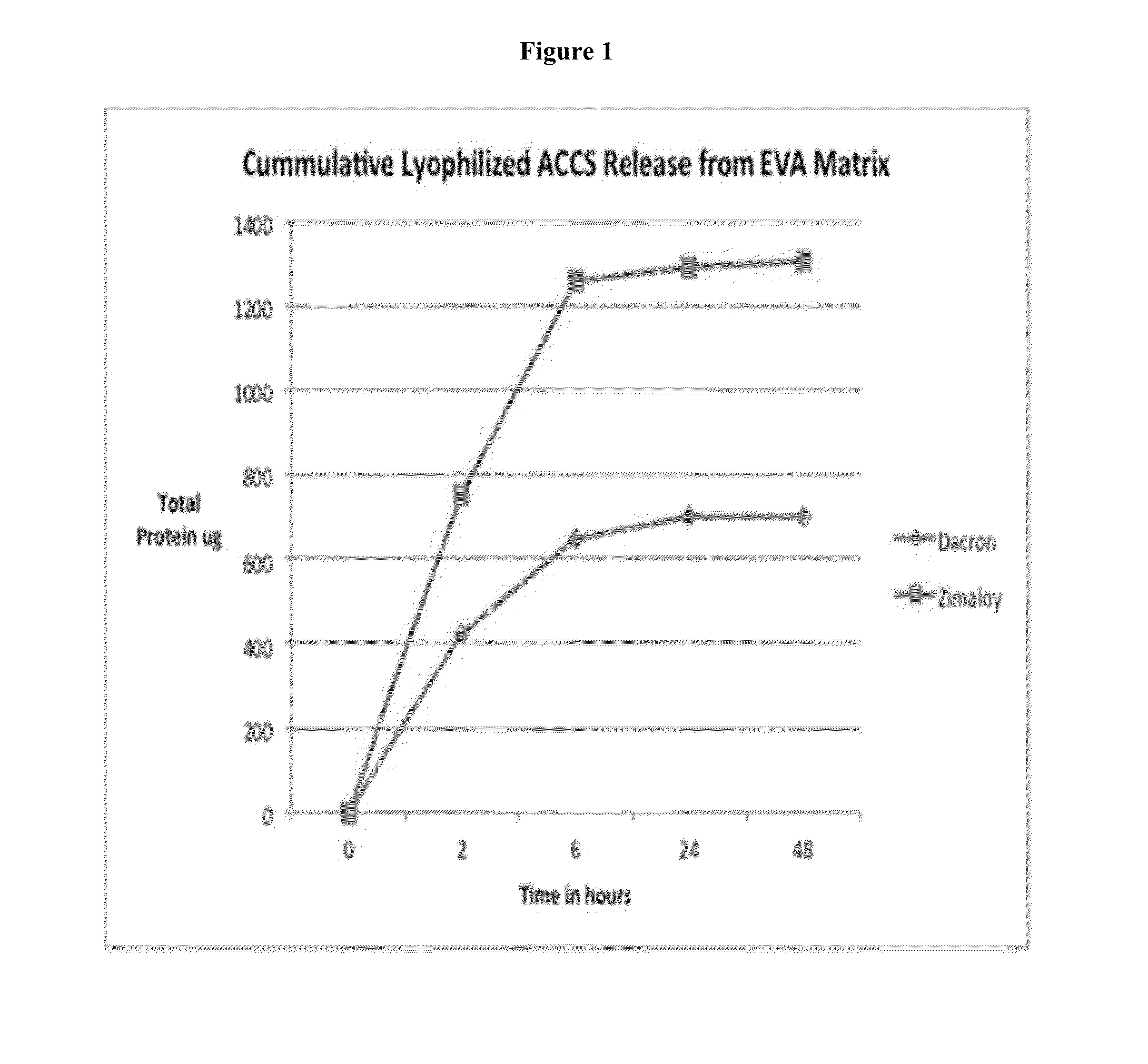Medical Device
a medical device and technology of a stent are applied in the field of medical devices, which can solve the problems of limiting the lifespan of the useful prosthesis, the decreasing the stent's lifespan, so as to reduce the effectiveness of the medical device, reduce the cost, and reduce the effect of the cos
- Summary
- Abstract
- Description
- Claims
- Application Information
AI Technical Summary
Benefits of technology
Problems solved by technology
Method used
Image
Examples
example 1
Preparation of AMP Cell Compositions
[0112]Amnion epithelial cells were dissociated from starting amniotic membrane using the dissociation agents PXXIII. The average weight range of an amnion was 18-27 g. The number of cells recovered per g of amnion was about 10−15×106 for dissociation with PXXIII.
[0113]Method of Obtaining Selected AMP Cells—
[0114]Amnion epithelial cells were plated immediately upon isolation from the amnion. After ˜2 days in culture non-adherent cells were removed and the adherent cells were kept. This attachment to a plastic tissue culture vessel is the selection method used to obtain the desired population of AMP cells. Adherent and non-adherent AMP cells appear to have a similar cell surface marker expression profile but the adherent cells have greater viability and are the desired population of cells. Adherent AMP cells were cultured in basal medium supplemented with human serum albumin until they reached 120,000-150,000 cells / cm2. At this point, the cultures w...
example 2
Generation of ACCS
[0115]The AMP cells of the invention can be used to generate ACCS, including pooled ACCS. The AMP cells were isolated as described above and about 1×106 cells / mL were seeded into T75 flasks containing ˜10 mL culture medium as described above. The cells were cultured until confluent, the medium was changed and ACCS was collected 3 days post-confluence. Optionally, the ACCS is collected again after 3 days, and optionally again after 3 days. Skilled artisans will recognize that other embodiments for collecting ACCS from confluent cultures, such as using other tissue culture vessels, including but not limited to cell factories, flasks, hollow fibers, or suspension culture apparatus, etc. are also contemplated by the methods of the invention (see Detailed Description above). It is also contemplated by the instant invention that the ACCS be cryopreserved, lyophilized, irradiated or formulated for sustained-release following collection. It is also contemplated that ACCS b...
example 3
Generation of Pooled ACCS
[0116]ACCS was obtained essentially as described above. In certain embodiments, ACCS was collected multiple times from an AMP culture derived from one placenta and these multiple ACCS collections were pooled together. Such pools are referred to as “SP pools” (more than one ACCS collection / one placenta). In another embodiment, AMP cultures were derived from several placentas, i.e. from 5 or 10 placentas. The AMP cells from each placenta were cultured and one ACCS collection from each culture was collected and then they were all pooled. These pools are termed “MP1 pools” (one ACCS collection / placenta, multiple placentas). In yet another embodiment, AMP cell cultures were derived from several placentas, i.e. from 5 or 10 placentas. The AMP cells from each placenta were cultured and more than one ACCS collection was performed from each AMP cell culture and then pooled. These pools are termed “MP2 pools” (more than one ACCS collection / placenta, multiple placentas...
PUM
| Property | Measurement | Unit |
|---|---|---|
| concentration | aaaaa | aaaaa |
| concentration | aaaaa | aaaaa |
| weight | aaaaa | aaaaa |
Abstract
Description
Claims
Application Information
 Login to View More
Login to View More - R&D
- Intellectual Property
- Life Sciences
- Materials
- Tech Scout
- Unparalleled Data Quality
- Higher Quality Content
- 60% Fewer Hallucinations
Browse by: Latest US Patents, China's latest patents, Technical Efficacy Thesaurus, Application Domain, Technology Topic, Popular Technical Reports.
© 2025 PatSnap. All rights reserved.Legal|Privacy policy|Modern Slavery Act Transparency Statement|Sitemap|About US| Contact US: help@patsnap.com

